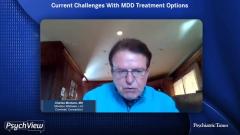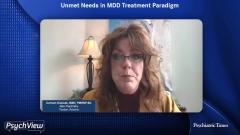
Treatment Approaches for Episodic and Chronic MDD
Experts in psychiatry share their treatment approaches for the management of episodic and chronic MDD.
Episodes in this series

Gus Alva, MD, DFAPA: I love the sophistication of the themes that you have both been touching on. Because of that, I’d like to cover another very important concept, and that is, how are you currently treating episodic and chronic major depressive disorder [MDD]? In other words, are you treating them differently or are you using a paradigm like with migraines, where the thought now is more preventive in nature, and then subsequently if an acute episode occurs, you can deal with that as well, or simply dealing with acute episodes? You see where I’m going at with this. What is your current approach in dealing with patients right now, and what characteristics should our colleagues keep in mind when selecting treatments for either an episodic or a chronic type of approach with MDD?
Charles Montano, MD: I look at depression as both chronic and episodic. I have a hard time parsing that out. I think it’s chronic because you have a susceptibility––at some point you’ve injured the brain. When you are in an episode the most important thing is to get it right the first time and not to saddle the patient with problematic [adverse] effects. I think Carmen is correct; access and availability is a problem for many. If the pharmaceutical companies––and I’ve got to put a plug in for them at this point––don’t work at assisting the provider with the way that they can obtain a prior authorization, we don’t get paid for those prior authorizations. It’s a lot of work, but your patient’s going to be back a thousand times doing poorly and will not do well if we don’t get the job done. Having that access and availability and being proactive at trying to get those prior authorizations is so important. Having someone in the office that’s skilled and has a heart and wants to do that, it’s worth gold. If you look at getting it right the first time, you need to tell the patient they [have] a 50/50 chance, just like you said, Gus, at requiring medication and having another episode of depression. If they do [have another episode], then you’ve got to think of long-term therapy. If they don’t respond to treatment, and you have used your resources—and I love that you’re doing video work as well with psychiatric outreach—…we’ve got to have more interaction between psychiatry and primary care. We probably will use the video to do that many times. I think that every primary care doctor should learn from the psychiatry consults that they ask for. It’s important because then they become more skilled, more knowledgeable, and able to sometimes avoid needing to have the patient see the psychiatrist. I think newer drugs are in many ways superior to the original SSRIs [selective serotonin reuptake inhibitors] and SNRIs [serotonin and norepinephrine reuptake inhibitors]; not all of them, there’s still some good SNRIs, but the [adverse] effects can be problematic.
Gus Alva, MD, DFAPA: Are you referring to dealing with a problem from a chronic or an episodic perspective?
Charles Montano, MD: I see that the diseases are usually episodic, that [chronic] people never get all the way better, sometimes they don’t. So they have these flares, like Carmen says the wavy line that goes up and down, that is more likely than having complete healing and then going back in. They can have that, but it’s much more problematic to have that chronic [recurrence] and not be completely healed. I always [tell] a patient, “You came in and when you came here, I made a little note in the corner of the chart.” I used to be able to have those kinds of paper charts, now I dictate. I say, “If 10 out of 10 is the best you’ve ever felt and zero is lower than whale manure, where are you with your depression right now?” A 2 or a 3 out of 10 is not good. You must always ask about suicidality or give them the PHQ-9 [Patient Health Questionnaire-9] and look at that last question. The next thing I will do is time progresses. I will ask, “How do you feel right now in terms of your depression?” If they say, “I’m so much better,” I say, “Oh really? Where are you on that scale, 10 being the best you’ve ever felt, zero lower than whale manure?” “Well, I’m probably a 6.” “Really? What’s missing for you to be a 10?” What’s missing? And that is where that chronic intermittent recurrent phase is always hiding.
Gus Alva, MD, DFAPA: I love that you touched base on that. Is that the spot at which she would consider maybe an augmentation approach, like, say, an atypical antipsychotic added to an antidepressant, maybe repetitive transcranial magnetic stimulation? In the case of suicidal ideation, obviously, that’s an urgent situation. We know that maybe a glutamatergic-acting agent intranasally might be advantageous. Those are great examples of that. Can you give us a little bit more detail regarding how you would approach that? In those particular [cases].
Charles Montano, MD: Yes, absolutely. The first thing I would do is reassess diagnosis and look for comorbidities. If it is ADHD I’m going to treat that independently; if it’s an anxiety disorder, I’m going to try to be more aggressive at treating. It could be OCD [obsessive compulsive disorder], who knows? I will always be looking for a comorbidity. If there is no base, there’s no obvious comorbidity; also, substance abuse is another thing that we must think about. If there’s not that going on and they’re adherent with the medication, I don’t want to lose what I’ve got. I’m going to try to do another mechanism of action, with augmenting strategy to improve them, to take them over the top to where they belong. And of course, looking at their lifestyle, seeing if they have a cutout for psychotherapy [is important]. Good psychotherapy is magic in these ways. But we must get the hardware working as best as possible before trying to work with the software.
Gus Alva, MD, DFAPA: Carmen, what do you think?
Carmen Kosicek, MSN, PMHNP-BC: I absolutely agree with Charles, psychotherapy is huge. I know digital therapeutics are on the rise; hopefully, the financial aspect will be covered so that it is available, especially for providers like me, [who] specialize in rural markets. But what do I specifically do? I think this is what people need to hear. Again, everything that Charles has just said. So, [the] patient comes to me, they’re on an SSRI, they came out of primary care, maybe they’ve been on 2 of them [SSRIs], [and] immediately [it’s the] same thing, same testing. We’re not in a bipolar spectrum, but even if we are, many of the newer antipsychotic agents have a built-in SSRI. However, lately there is a new player to the market, before you must jump to an antipsychotic, that begs consideration. The reason is exactly what Charles said: What are the [adverse] effects of all these [medications]? Without the [adverse] effect of tardive dyskinesia the newer agent to the market is the dextromethorphan with bupropion to consider. I know that you mentioned, Gus, …a nasal [agent], and I understand there’s been a lot of challenges with the areas that I practice in where patients could or could not get that. It depends on what you’re using. I fully agree with the add-on approach because this is like a heart attack for the brain. I need to be considerate of which agent I am putting [patients] on. For example, if I put something with a high technically, it’s low, which means a tighter bond of a Ki value–binding affinity with lumateperone, I must be mindful of the half-life. If they’re not consistent in taking it, if they miss that 2 times in a week, are they truly going to be at a therapeutic state because they haven’t met 4 to 5 half-lives to be at that state? Also, [because] the Ki value–binding affinity with serotonin is through the roof, I’m not going to leave another SSRI on board because they could increase anxiety, or you could have serotonin syndrome or the sweatiness, that type of thing. If I went with another antipsychotic such as cariprazine––great [medication], just like the other options––…it has a 7-day half-life and I must account for that upswing, and I’ve got a heart attack on my hands for the brain. Those are the things that I consider. With the newer agent for MDD, again, the dextromethorphan with bupropion mix, I need to get those other agents off because as it slows things up in the liver, that could lead to other [adverse] effects. In the literature, there are even more [medications] on the horizon that I’m excited for because it’s been a long time for us to get these new agents. It’s imperative that as prescribers, we understand the ins and outs of the [medications] and what the rationale is of why you keep things on as you supplement, or, if you must look at pharmacokinetics and dynamics, why…you take other things off. I see that as an area of improvement for all of us, because unless you’re well versed in these, unless someone is showcasing how you can get these [medications], how would you have the experience? I thank you both for having this discussion so that others can learn.
TRANSCRIPT EDITED FOR CLARITY
Newsletter
Receive trusted psychiatric news, expert analysis, and clinical insights — subscribe today to support your practice and your patients.

















